Filter by

Histories of technology, the Environment and Modern Britain
Histories of Technology, the Environment and Modern Britain brings together historians with a wide range of interests to take a uniquely wide-lens view of how technology and the environment have been intimately and irreversibly entangled in Britain over the last 300 years. It combines, for the first time, two perspectives with much to say about Britain since the industrial revolution: the histo…
- Edition
- -
- ISBN/ISSN
- 9781911576570
- Collation
- xii, 354 p. : B&W, ill.
- Series Title
- -
- Call Number
- 609.41 AGA h

Cybersecurity : public sector threats and responses
The Internet has given rise to new opportunities for the public sector to improve efficiency and better serve constituents. But with an increasing reliance on the Internet, digital tools are also exposing the public sector to new risks. This accessible primer focuses on the convergence of globalization, connectivity, and the migration of public sector functions online. It examines emerging tren…
- Edition
- -
- ISBN/ISSN
- 9781439846643
- Collation
- xxix, 354 p. : ill
- Series Title
- -
- Call Number
- 352.379 AND c
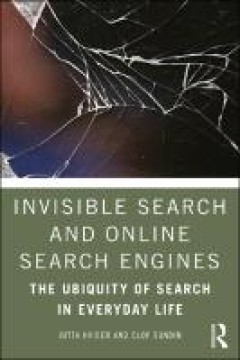
Invisible search and online search engines
Invisible Search and Online Search Engines considers the use of search engines in contemporary everyday life and the challenges this poses for media and information literacy. Looking for mediated information is mostly done online and arbitrated by the various tools and devices that people carry with them on a daily basis. Because of this, search engines have a significant impact on the structur…
- Edition
- -
- ISBN/ISSN
- 9780429448546
- Collation
- viii, 151 p. : ind. ; 24 cm
- Series Title
- -
- Call Number
- 025.0425 HAI i
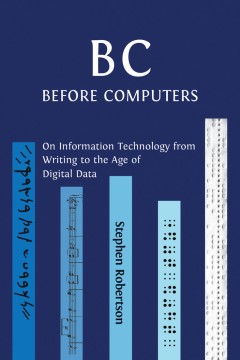
B C, Before Computers : on information technology from writing to the age of …
I found it a delight to read. The author is not trying to write yet another book on the history of computer developments but rather to show that those developments rely on a long history of humans creating solutions to problems that arose as they became more and more sophisticated in their treatment of concepts of information and its manipulation. In many ways it resembles a work of philosophy …
- Edition
- -
- ISBN/ISSN
- 9781800640313
- Collation
- 170p.: colour, ill.
- Series Title
- -
- Call Number
- 004.09 B r
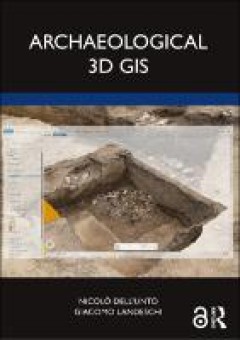
Archaeological 3d GIS
Archaeological 3D GIS provides archaeologists with a guide to explore and understand the unprecedented opportunities for collecting, visualising, and analysing archaeological datasets in three dimensions. With platforms allowing archaeologists to link, query, and analyse in a virtual, georeferenced space information collected by different specialists, the book highlights how it is possible to r…
- Edition
- -
- ISBN/ISSN
- 9781003034131
- Collation
- XXI, 154 p.
- Series Title
- -
- Call Number
- 930.1028 DEL a

Right research : modelling sustainable research practices in the anthropocene
Educational institutions play an instrumental role in social and political change, and are responsible for the environmental and social ethics of their institutional practices. The essays in this volume critically examine scholarly research practices in the age of the Anthropocene, and ask what accountability educators and researchers have in ‘righting’ their relationship to the environment…
- Edition
- -
- ISBN/ISSN
- 9781783749638
- Collation
- xxiii, 560 p. ; ill
- Series Title
- -
- Call Number
- 304.2 MIY r
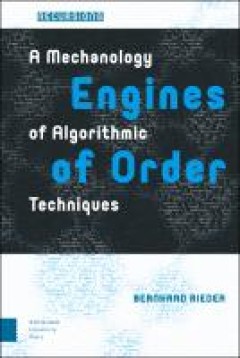
Engines of Order : A Mechanology of Algorithmic Techniques
Over the last decades, and in particular since the widespread adoption of the Internet, encounters with algorithmic procedures for ‘information retrieval’ – the activity of getting some piece of information out of a col-lection or repository of some kind – have become everyday experiences for most people in large parts of the world.
- Edition
- -
- ISBN/ISSN
- 9789048537419
- Collation
- 353 p.: ill.
- Series Title
- -
- Call Number
- 518.1 RIE e
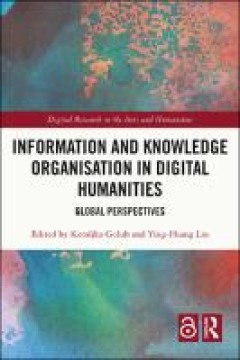
Information and knowledge organisation in digital humanities: global perspect…
Information and Knowledge Organisation explores the role of knowledge organisation in the digital humanities. By focusing on how information is described, represented and organised in both research and practice, this work furthers the transdisciplinary nature of digital humanities. Including contributions from Asia, Australia, Europe, North America and the Middle East, the volume explores the p…
- Edition
- -
- ISBN/ISSN
- 9781003131816
- Collation
- xxiii, 290 p. : ill.
- Series Title
- Digital Research in the Arts and Humanities
- Call Number
- 658.038 GOL i
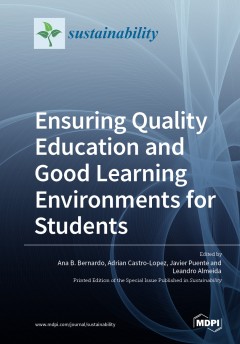
Ensuring quality education and good learning environments for students
Today, new technologies bring with them an everchanging panorama, forcing us to constantly update our knowledge. For this reason, quality education is necessary in all areas of knowledge and at all educational levels. The quality of our educational systems and the questions raised by reviewing whether our educational institutions offer quality education or not are some of the main reasons why q…
- Edition
- -
- ISBN/ISSN
- 9783036524450
- Collation
- x, 254 p. : ill.
- Series Title
- -
- Call Number
- 370 BER e

The evolutionary dynamics of discursive knowledge : communication-theoretical…
This open access book have three themes have been central to Leydesdorff's research: (1) the dynamics of science, technology, and innovation; (2) the scientometric operationalization of these concept; and (3) the elaboration in terms of a Triple Helix of university-industry-government relations. In this study, I discuss the relations among these themes. Using Luhmann's social-systems theory for…
- Edition
- -
- ISBN/ISSN
- 9783030599515
- Collation
- x, 247p. : ill.
- Series Title
- -
- Call Number
- 301.072 LEY e
 Computer Science, Information & General Works
Computer Science, Information & General Works  Philosophy & Psychology
Philosophy & Psychology  Religion
Religion  Social Sciences
Social Sciences  Language
Language  Pure Science
Pure Science  Applied Sciences
Applied Sciences  Art & Recreation
Art & Recreation  Literature
Literature  History & Geography
History & Geography